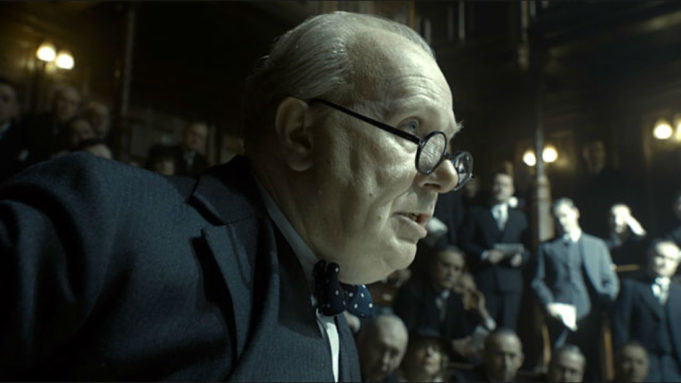I’m going to start this negative review of Darkest Hour by saying good things about this film. First of all, this is the best movie ever made about Winston Churchill. That is faint praise considering the competition, but there it is. It shows Churchill not as a stalwart fighting leader but as a man plagued by self-doubt, making a hard decision to stay at war with Nazi Germany at a time when it’s not clear that that’s the right move. It also shows him doing ethically questionable things in service of the war effort, like lying to the British public and ordering a 4,000-strong garrison at Calais to launch an attack he knows to be suicidal. It makes a nice companion piece to Christopher Nolan’s superior Dunkirk, taking place at the same time and showing how decisions made in London impacted the soldiers trapped on that beach. For all that, I found much underwhelming about this World War II drama, including Gary Oldman’s highly touted performance in the lead role.
He portrays Churchill, an unpopular politician regarded as a hothead with a track record of failing at big projects. Nevertheless, in May 1940, he’s handed the prime minister’s office when Neville Chamberlain (Ronald Pickup) is deposed and his heir apparent Viscount Halifax (Stephen Dillane) declines the job at such a perilous time. The keys to 10 Downing Street are a prize Winston has craved his whole life, but he knows that with France and Belgium about to fall and the British army trapped on Dunkirk, he may be set up to be the man who loses the empire. With many of his fellow Conservatives and King George VI (Ben Mendelsohn) urging him to go to the Nazis and seek peace, Winston debates whether to heed their advice or keep fighting and hope that the army can be extricated.
Let me say that Oldman’s not bad here. This is an actor who can be quite bad at times (look no further than this past spring’s The Space Between Us for a terrible performance from him), but here his scene-chewing tendencies are ameliorated by the blustery character of Churchill, and he nicely conveys the man’s depressive tendencies and churlish temperament as he takes over the country at a stressful time. It certainly helps that he’s given all the good lines in Anthony McCarten’s script: “Would you stop interrupting me when I am interrupting you!” he thunders at Halifax. Yet his performance is devoid of any surprising elements, despite the film’s invitation to see Churchill in a new light, and his delivery of the prime minister’s famous speeches is curiously unmoving. The upcoming The Post has a better performance (by Meryl Streep) as a leader who makes the tough decisions despite being scared. Forget the best acting performances this year, this doesn’t even rank among Oldman’s top five performances in his career. (Fine, since I brought it up: Sid and Nancy, Rosencrantz & Guildenstern Are Dead, Air Force One, The Dark Knight, and Tinker Tailor Soldier Spy all feature better work from him.)
He’s nowhere near the biggest of this movie’s issues, though. Director Joe Wright is a stolid and unimaginative filmmaker who has been propped up by the industry and an adoring press on his side of the pond because his movies are so veddy, veddy British. The film doesn’t drag as it depicts the political intrigue swirling around Churchill, but the scenes between Winston and his wife Clementine (Kristin Scott Thomas) are leaden. Having the proceedings seen from the point of view of Churchill’s new personal secretary Elizabeth Layton (Lily James) is a rickety device, too, especially since the real-life Layton didn’t start working for Churchill until 1941.
By far the worst thing here is the scene late in the film when, shortly before making his final decision, Winston takes a ride on the Underground for only the second time in his life and meets with the ordinary people on the train, who all tell him to keep on with the struggle against the Nazi bastards. This scene felt fake to me as I was watching it, and that was before I did my historical research and found that it is indeed invented from whole cloth. The passengers even include a Caribbean man, as if Churchill would have ever been caught dead taking a black man’s advice on how to lead the country. The pandering to modern sensibilities left me feeling insulted, and it would be enough to derail a better movie than this. Not all that distinguishable from other tributes to stiff-backed British resolve in the face of adversity, Darkest Hour is overhyped, over-serious, and over here.
Darkest Hour
Starring Gary Oldman, Lily James, and Kristin Scott Thomas. Directed by Joe Wright. Written by Anthony McCarten. Rated PG-13.













# This movie(DARKEST HOUR) and DUNKIRK fails to tell the truth about Churchill and his lying or his deliberate untruthfulness blaming the Belgian King and the Belgian army for the BEF’s defeat in 1940.
The BBC on THE GREAT LIE !
https://youtu.be/Py-bZ3XMHcI
Admit it — you are a hater. Winston Churchill was many things, not least of which was very, very human. He had many faults. Yet, he was a great leader, held the U.K. together through an unimaginable crisis, and eventually collaborated with three other great leaders (Roosevelt, Chiang and Stalin — all of whom were also deeply flawed) to win a war that should have been a disastrous loss for civilization. All those four of those men lied, all of them committed monumental blunders — and won a war. The World changed, and the Law of Unintended Consequences gave us a world that we could not have predicted. Get over your bitterness. It is childish and reflects a serious failure to understand how flawed we all are.
Unlikely that Lin knows much about this period in history or Churchill. Seems like a predisposed dislike of the movie. based on a dislike of the director. I thought the script and Oldham’s acting did a terrific job of capturing the greatness and the faults of Winston Churchill. Sure, the underground scene was contrived, but, who cares. Cinematography was excellent and creative.
It’s obvious the nitwit who wrote this review is a Churchill heater and would probably be a Chamberlain-obama appeaser. She doesn’t realize that great Britain’s refusal to surrender killed Hitler’s plan to only have to fight a one front war. If Britain gave in she would be speaking German today.
A great movie and a rotten review, especially since the subject matter deserves far, far better.
So some scenes were invented, oh the horror! As if that were uncommon in biopix. And while Churchill in real life may not have been that friendly to the Caribbean man, the scene in the Underground neatly captured Churchill’s definitely historic support from the British people at the time. Actually, if you ask me, that scene is one of the more brilliant in the film in the way it gets across a complex message in an effective fashion.
But let’s get to brass tacks. Winston Churchill saved Western Civilization, and that is no hype. And he did it with the most common of resources — words. He rallied the English people, and the UK’s Allies with a gift for speeches that shook the world. Woe are we to live in a time when such skills are no given their due.
Yes, Churchill did make statements to the people that were not true. But it is obvious that if he had been truthful, the trajectory of the war would most likely have been very, very different. A lesson in why foreign policy can not be run with leaky faucets of documents.
And yes, Churchill was an elitist. He did not care much for non-Europeans. And in this age of purity absolutism, that may be a bridge too far for some to cross, because on balance this remains an historic figure who deserves respect and admiration.
Finally, there is one factor not mentioned in any of the reviews I have read. The movie is a masterpiece of doing the right thing when you know you are right, regardless of the odds, and regardless of your own self-doubts. And of digging deep, when the chips are down, and finding brilliance.
“stiff-backed British resolve…” no matter how it came about, was very, very real. Britain stood alone, and her people did want to fight. Just like they have fought down the centuries. This author probably thinks most Britons have crumpets and tea every day and regularly trip over their stiff upper lip. The Brits are a warrior race, with a DNA to fight, and Churchill grasped this innate sentiment. The tube train scene may be fiction, but its based on fact. Polling results showed a big majority to stand and fight, no matter what the odds. The Director uses the scene as an allegory. Too difficult a concept obviously for this critic to realise.
I was completely entranced by Oldman’s performance. I even got emotional (I’m a 65 year old former hockey player — i don’t get emotional) when the King paid Churchill a visit and told him he backed him in his wanting to fight, when everyone seemed to feel the opposite. I had the thought — this moment, if it really happened, saved the world! I Churchill gave in to Halifax and Chamberlain, who wanted Hitler to like them and play ball with the “savage” as Churchill called him, this would be a different world we live in today. Great movie. Suspect review.
The problem with Kristian Lin is that he knows no history– only fantasy, Oldman gave a performance better than any of Olivier’s–and that is saying a great deal. Also Scott-Thomas as Clementine Churchill was excellent. Great script. The movie will endure and has the distinction of elevation above the usual tawdry over politicizing, violent attempts of Hollywood to normalize revisionism, mediocrity and worse.
I have yet to see the film but I do have to take issue with the reviewer on this point
“It also shows him doing ethically questionable things in service of the war effort, like lying to the British public and ordering a 4,000-strong garrison at Calais to launch an attack he knows to be suicidal. It makes a nice companion piece to Christopher Nolan’s superior Dunkirk, taking place at the same time and showing how decisions made in London impacted the soldiers trapped on that beach. ”
Does the author really believe that you could fight a war and mobilise a national resolve by revealing every facet and problem that faced us? Does he think that a leader should explain to his people (and in turn his enemies) how perilous our situation truly was? Can he not grasp the monumental importance of projecting confidence and strength to achieve a goal that, without exaggerration, saved the Western world but sacrificed us in the process?
With regards to Dunkirk, whilst it might have had some nice imagery, it was overly (and pretentiously) convoluted and never in my mind truly conveyed the absolute peril that this country faced.
I’m a Brit who’s just seen DH and thought Kristian Lin’s review was the closest I’ve read that mirrors my view. I’m an admirer of Churchill but not of this awful film. It’s an hour later, and my toes are just beginning to uncurl after that dreadful, completely made up, scene on the London Underground. It was laughably ham-fisted.
It was a dramatic period in history but this lamentable film felt it had to turn the drama up to 11, something the subject didn’t need, in fact deflecting from the drama of the reality. Death of Stalin was a far more realistic and intelligent film.
I am happy to have come across a rare review that does not buy into the oscar-bait hype of this movie. Most critics are raving about Darkest Hour,” but why? It could have been mediocre at best, another soggy and pulseless biopic if not for the cringeworthy decisions it made: a) focusing so much on the secretary and Winston’s wife and b) that sad subway scene. The pacing of the movie was too slow, it was weirdly devoid of drama for just a dramatic time in history, and it was blatantly anti-historical.
Ugh that train scene. It was so cheesy that my friend and I both thought of those lame history episodes of Dr. Who featuring Churchill (you know the ones). Having a little girl and a black guy act as his inspiration is a very Steven Moffat thing to do. Can’t we just agree that historical persons sometimes have different values than people today? It’s too bad that the film lacked the courage to portray the real man and his flaws and instead preferred presenting an idealized idea of Churchill in his place.
Great film with great acting and stunning makeup artistry, the best I’ve seen since “Tootsie”. I also loved the scene in the Underground, even if it was contrived. Kristian Lin is obviously an Obama voter, who would have sided with Chamberlain and Halifax. Thank God that Western civilization had Winston Churchill when we did!
The Underground scene made me cringe. Shoehorning diversity BS in what ought to have been a gloriously nationalistic movie like “Dunkirk”. There was even a rapt Pakistani lady in the carriage! I’m surprised they didn’t have a pink-haired homosexual snogging next the Churchill. Ruined the movie.